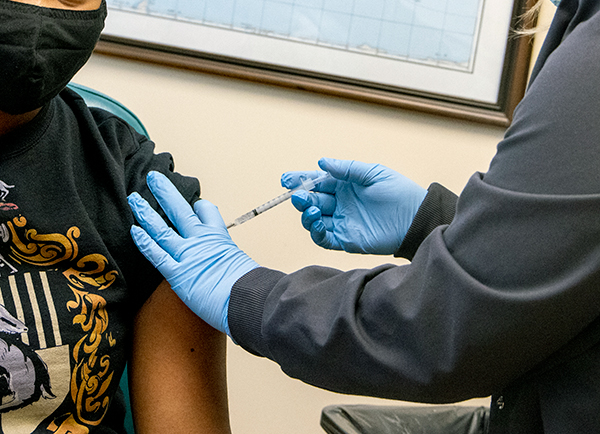COVID-19 Vaccines and Infertility: Here’s What We Know
There’s a lot of misinformation floating around the internet about the COVID-19 vaccines. It can be challenging to distinguish between what’s true and what isn’t. The University Health Center is here to clear up any confusion and support students, faculty, and staff in making informed-decisions about their health and well-being.

One of the biggest questions surrounding the COVID-19 vaccines is do they contribute to infertility? The short answer is no, but let’s break down the science!
The idea that the COVID-19 vaccines cause infertility was apparently based on the unfounded theory that the spike protein on the surface of the SARS-CoV-2 virus was slightly similar in appearance to a protein known as Syncytin-1, which impacts placental growth. However, when scientists looked closer at these two proteins, the similarities were actually not present. The SARS-CoV-2 spike protein consists of 1273 amino acids, which the Syncytin-1 is only 538 amino acids. Aside from obvious size differences, sequencing of the two proteins was performed, finding only a single sequence of 5 amino acids that were remotely similar, but not identical. This dispels the theory that the vaccine may produce antibodies that would recognize this protein and possibly inhibit placental growth and development (Evans, 2021 & Morris, 2020).
Researchers also point out that if it were true that immune response triggered by a vaccine could make one infertile, then so, too, would innate immune response triggered by viral infection. Studies in pregnant women who have received the vaccines thus far have shown no significant differences in the rate of pregnancy complications such as preeclampsia/eclampsia, intrauterine growth restriction, gestational diabetes, or neonatal outcomes (including small for gestational age infants, congenital anomalies, stillbirth/neonatal death). As of July 19, 2021, there were more than 136,500 pregnant women registered through V-Safe registry who were pregnant at the time of vaccination.
In addition, the American College of Obstetricians and Gynecologists (ACOG) Practice Advisory from December 2020, COVID-19 Vaccine Considerations for Obstetric-Gynecologic Care claims “linking COVID-19 vaccines to infertility are unfounded and have no scientific evidence supporting them… ACOG recommends vaccination for all eligible people who may consider future pregnancy.”
DART studies (Developmental and Reproductive Toxicity) performed thus far in the U.S. and Europe have shown no effects on fertility, no with fetal/embryonic development or post-natal development.
Vaccines likewise do not cause male infertility or erectile dysfunction. However, acute COVID-19 infection has been noted to affect sperm production, as has been documented with numerous viral infections, especially Zika and mumps.
Still have questions about the COVID-19 vaccine or infertility?
We encourage you to talk to one of our medical providers at the University Health Center, or your primary care physician. If you’re interested in receiving the COVID-19 vaccine, log on to your Patient Portal or call 706-542-1162 to schedule an appointment.
References:
- https://www.cdc.gov/coronavirus/2019-ncov/vaccines/facts.html
- https://www.acog.org/clinical/clinical-guidance/practice-advisory/articles/2020/12/covid-19-vaccination-considerations-for-obstetric-gynecologic-care
- https://www.acog.org/news/news-releases/2021/07/acog-smfm-recommend-covid-19-vaccination-for-pregnant-individuals
- https://www.fertstertdialog.com/posts/covid-19-vaccine-and-infertility-baseless-claims-and-unfounded-social-media-panic
- https://www.sciencedirect.com/science/article/pii/S2666334121000684

Written by Camilla Herndon, Healthy Relationship Coordinator, The Fontaine Center / UHC Health Promotion and Dr. Cary Perry, Physician, UHC Gynecology Clinic
